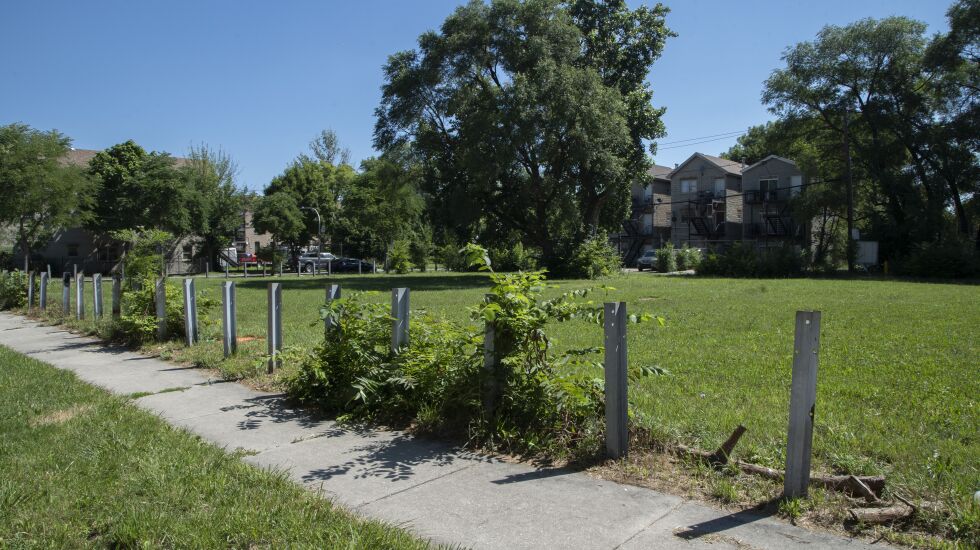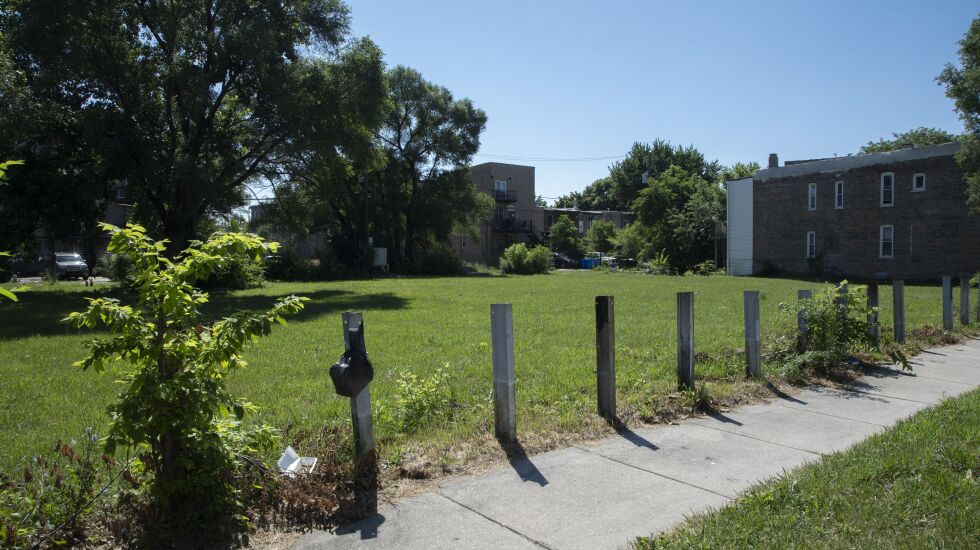
For the Cook County treasurer’s office, 19 lots that remain vacant in North Lawndale illustrate how redlining practices dating back decades continue to have ripple effects in Black and Brown communities.
A new report released Tuesday from Cook County Treasurer Maria Pappas links racially discriminatory practices to today’s vacant and abandoned properties. To do so, her office examined the decades-old redlining maps and then compared them to the locations of properties listed in the county’s scavenger sales.
“It was an ‘oh my God’ moment,” Pappas said. “We all realized that there was a correlation between everything that happened in 1940 — redlining and legislation in 1940s that the state legislature passed about scavenger sales to try to help with these distressed properties.”
Scavenger sales happen every two years, and it includes a list of properties owned by individuals who have fallen behind on taxes for three or more years in the last 20 years, according to the treasurer’s office.
During this year’s scavenger sale, 14,085 out of 27,358 properties are located in areas that would have fallen under redlining maps from 1940. Of those properties, the treasurer’s office determined that 57% of those properties were in areas that were redlined, and another 40% were in areas that were considered declining because of the changing racial make-up.

Redlining was used to mark communities as “undesirable” because of its racial make-up, according to an academic project that examined these past policies.
The process of redlining is tied to the history of mortgage lending, and it dates back to the years following the Great Depression and started to be more frequently used after World War II, said Geoff Smith, the executive director of the Institute for Housing Studies at DePaul University.
“The housing market was really rapidly expanding, and in that time period you saw very specific investments happening in the suburbs and in predominantly white communities,” Smith said. “And you saw, really, not as much investment happening in urban areas, particularly urban areas that were predominantly Black. And that along with racist policies has led to continued disinvestments in these neighborhoods.”
The treasurer’s report determined that properties within areas that were once redlined are 2.75 times more likely than those outside of those areas to either be listed on a scavenger sale, end up being owned by the city or controlled by the Cook County Land Bank Authority.
Pappas said former investigative journalists who now work in her office spent a year working on the analysis, and they received help from University of Chicago students.
The city’s 16th Ward — which includes parts of Englewood and Chicago Lawn — had the highest number of properties listed in the 2022 scavenger sale. In total, 1,807 properties from that ward were placed in the 2022 scavenger sale.
Asiaha Butler, the co-founder and CEO of the Resident Association of Greater Englewood, said the group has been trying to learn more about scavenger sales. She once had a property that ended up on the list, but she was able to redeem it by paying the delinquent taxes. She notes that there still isn’t a payment plan available for homeowners to do so.
“Is this the best system to rectify delinquent taxes,” Butler said. “...Is there a way to help individuals who might have lost their homes to taxes more so than purchasing the land and property? That is the part that we have not come up with a solution (for).”
The top 15 Chicago aldermanic wards that had the highest number of properties listed in scavenger sales today have a large number of Black or Latino residents, according to the treasurer’s report.
Pappas said she would like for the report to spark discussions among various government entities to figure out reforms.
“We think that there will be hearings about this report, and there will be collective decisions about how to move forward,” she said.
The report recommends overhauling the system for properties that fall behind on taxes by making the scavenger sale optional and establishing a county trustee program that would give it the authority to auction off properties to local developers, local governments or nonprofit agencies. The office would also like to see the interest penalty lowered for those who don’t pay property taxes on time.
Hal Dardick, director of research for the Cook County treasurer’s office, said the office would also like to see the reforms result in making information to the general public more accessible. One of the recommendations includes creating a database where people would be able to see information about the properties listed in upcoming scavenger sales.
“To make it easy for the small developers — the people that aren’t going to gentrify and want to build in their own communities — to come in and do this work,” Dardick said. “Right now, they are baffled by it and confused.”
Smith, who did not review the report but has worked on guides about scavenger sales in the past, said bidding on a property at a scavenger sale can be costly, and it could take years to get the deed to the property.
“Once you win the bid on the delinquent tax, then you are accountable for those property taxes going forward; there’s legal costs,” Smith said. “There are a lot of challenges and complexities to participate in the scavenger sale that makes it difficult for your everyday community resident — or even a community-based group or someone who is really invested in the neighborhood — wanting to take that tax-delinquent property and put it back in productive use.”
Elvia Malagón’s reporting on social justice and income inequality is made possible by a grant from The Chicago Community Trust.







